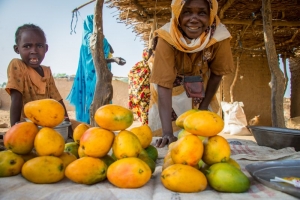
Children in a refugee camp in Darfur, where Caritas provides farming support. Annie Bungeroth/Caritas
“We have a global family meal plan,” said Joseph Cornelius Donnelly, Caritas Internationalis delegate to the United Nations in New York. He was speaking at the Caritas’ Right to Food workshop there last week.
“We are here as humanitarian advocates determined to challenge the international community about the right to food so we can eradicate hunger by 2025,” he said. “Governments must step up to the empty tables and put something sustainable out there for their citizens.”
The workshop, part of a larger UN meeting that drew 4000 people to New York, intended to challenge those responsible for national commitments and advocacy efforts to eradicate hunger.
And while Caritas continues to aid people who need food, it also asks governments to step up and honor commitments they have made to stop hunger. “The right to food has been ‘on the books’ for years, but too little attention has been given yet to this considerable global challenge,” said Mr. Donnelly.
Caritas staff from India, Brazil, the UK, Zimbabwe and other countries shared their experiences from communities where hunger is rife. All panelists addressed the extreme vulnerability of farmers, women, and young people living in poverty.
“One moment you have something; next day you have nothing,” was a common theme. Often the hungry live in conditions of conflict and violence, sustained injustice, and devastating uncertainty. Panelists agreed the global food crisis of 2008 opened the window on the problem more than ever.
“As people of faith with a conscience for our sisters and brothers, where are we with them?” said Zimbabwean Dadirai Chickwengo, who works on Caritas’ global advocacy outreach to convince governments to put people before corporations.
Dr. VR Haridas, an agriculture expert from Caritas India, noted not all change is automatically good. “It’s time to pay closer attention, to understand where food comes from and what it needs to grow to be healthful. The time has come to include climate change in all our concerns for food and hunger,” he said.
“Youth are builders with energy and possibilities. We must be part of the building up, restoring our communities,” said Leon Patrick from Caritas Brazil, who noted there are millions young people in Brazil without jobs. “We must see the opportunities.”
Caritas has launched a major campaign in this regard, based on “intolerable” levels of hunger around the world. The “One Human Family, Food for All” global campaign to end hunger by 2025 began in December 2013 with support from Pope Francis.
“Its primary hope includes making the right to adequate, nutritious food a reality for people everywhere, with no exceptions,” he said. “We need to be a thunderous voice from the ground up, speaking for countless people who are here with us in spirit to hold governments accountable to their pledges. Together we are more.”

